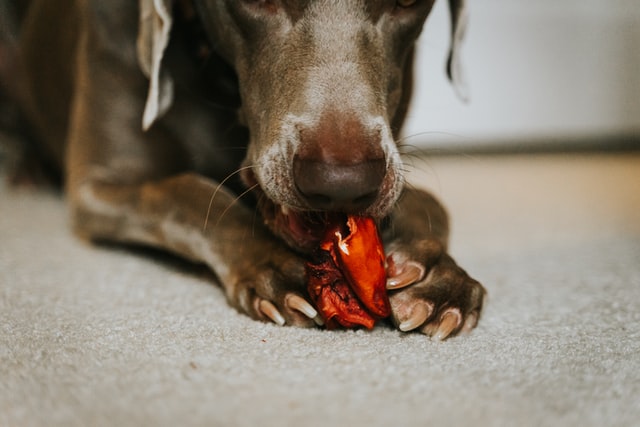Dogs are known to be obsessive diggers, but why do dogs want to bury bones? This behavior is mostly rooted in the canine’s wild instincts. However, the behavior can become annoying, especially if your pet is burying its prized treat on your flower patch. The instant molehill in your backyard is also not a good sight to behold.
In this post, we will discuss why dogs tend to bury items and what you can do to manage them. Just remember that the points below are based on my experience as a pet owner and may vary on other canines.
Why do dogs want to bury bones?
Take note that dogs will bury just about anything they deem precious. I remember stumbling upon a dog owner online named Hannah where her pet buried several items. It includes a whole bag of sausage, an entire beef jerky, candy, and a whole sleeve of Oreos.
This behavior is innate in dogs for several reasons, including the following:
🐶It’s a lingering instinct.

In the wild, dogs hide their food by burying it under the soil. This is to prevent other canines from stealing their meals. Take note that dogs intend to unearth these buried food items later on for survival. Also, it prevents predators from sniffing out the dog’s location.
This behavior is called caching. It’s observed in coyotes, red foxes, wolves, and other canids. These animals perform caching, so they will have stored food in case they can’t find prey later on. It’s a survival instinct that still lingers to this day among domesticated canines.
So if your dog chews its bone treat then decides to bury it in your yard, it’s a sign that he wants to enjoy it later.
Most of the time, caching isn’t something to worry about. However, it can get out of hand for many dogs. And if your dog won’t consume its bone treats in front of you, there might be something wrong.
🐶There are too many bones.
Canines are ‘programmed’ to perceive surplus supply. So when they detect that there are excessive resources, they will bury them in an effort to conserve and save it for later.
This is connected to wild dogs’ tendency to cache their food. Also, it means that you’re probably giving your dog too many bone treats or food in general.
🐶There’s a perceived threat.

Next, your dog may be sensing a threat in its environment. Such a threat pushes your dog to hide any food item that may invite the predator.
Take note that this behavior might indicate insecurity in your dog. For example, if there’s a new dog in your house, your resident pet may start burying its bone treats. It’s a form of protecting his belongings from the other dog.
Overall, you can train your dog to associate the new pet with something positive. Still, this won’t fully dampen a canine’s instinct to dig and bury.
🐶Your dog is bored.
Canine boredom is every pet owners’ enemy. Once your dog runs out of things to do, it will start to vent its energy into destructive or unusual behavior.
This is commonly observed in dog breeds known to have an intense level of energy. Some of which are German Shepherds, Golden Retrievers, Beagles, and Schnauzers.
Oftentimes, dogs dig as a form of mental and physical stimulation. And in the process, caching may also kick in, which may explain why your pet keeps on burying its bone treats or toys.
How to stop your dog from burying things

If your dog’s burying habit is getting out of hand, there are ways to manage or limit it. Here are a few steps you can take:
✔️Increase your dog’s exercise
Since boredom is a culprit in your dog’s affinity with digging and burying, the increased exercise will help a lot. This will also distract your dog from burying since it won’t have any excess energy to dig in your yard.
✔️Watch out for hoarding.
Excessive hoarding can lead your dog to bury various items outdoors. You can curb this by intervening in the early signs of hoarding.
If you notice that your dog is collecting its toys and keeping them in a hidden corner, call your pet right away. Ask it to bring or fetch the toy back. If your dog does so, reward it with a treat.
Through this method, you can teach your dog that giving back the toy is a rewarded behavior. In turn, your pooch will be less likely to bury it outdoors.
✔️Give one toy or treat at a time.
Remember that dogs bury surplus resources. With this, you should only give one to two treats or toys at a time. This way, your pet won’t feel compelled to hide it from predators.
By giving one toy at a time, your dog won’t get tired of it right away. You’ll be able to cycle multiple toys instead of giving it all to your dog at once.
Also, it’s best to hand out toys or bone treats in a room where your dog can’t hide them. And once your dog seems to lose interest, you should pick up the toy right away.
✔️Interrupt your dog’s burying
The moment you catch your dog digging or burying, you should call it right away. If your dog comes to you, give it a treat right away. However, if your pet continues to dig and bury, it’s best to limit its access outdoors.
Take note that you should never take away the item your dog is trying to bury without offering something in return. This is negative reinforcement, which can cause more problems in the long run.
✔️Don’t chase your dog
If you caught your dog burying, never yell and chase after him. Remember that chasing will appear as a game to your dog. It will keep digging and burying to initiate this response from you in the long run.
Most importantly, don’t punish or use physical violence to stop your dog from burying things. If all your efforts aren’t yielding results, it’s best to consult your dog’s veterinarian or a dog trainer.
✔️Make your yard unappealing to dig.
Another trick you can try is making your yard soil unappealing to your dog. For example, you can try putting pine cones on the spot where your pet likes to bury bones and other items.
This is because pine cones have a rough surface, which feels weird on a dog’s paws. Don’t worry because this won’t injure your pet.
If that didn’t work, you could try burying chicken wire around 1 to 2 inches underneath the soil. So when your dog tries to dig, the wire will serve as a barrier. This will stop your dog since the wire also feels uncomfortable on the paws.
Frequently Asked Questions
Q: Do dogs remember where they bury their bones?
A: Dogs can remember where they bury their bones and other items. This is possible since canines have associative and spatial abilities to locate the spot. Associative refers to the dog’s ability to trace the smell and appearance of the spot where the bone is buried. Meanwhile, spatial is a canine’s ability to remember the exact location based on the surrounding structures and markers.
Q: Why does my dog cry when burying his bone treats or toys?
A: Dogs make crying sounds after burying their bones or toys because of a positive reason. Your pet may seem sad, but the crying sound is actually the dog’s way of expressing contentment and happiness. Most of the time, it will cease after your dog leaves the burying spot.
Q: Why does my dog bury his treats in my bed?
A: Dogs bury food in a place they feel safe. So if your dog is burying its treats under your sheets, that means that the pooch sees your bed as safe ground. The only downside is that the treats will make a mess on your bed, not to mention the strong odor.
Q: Why is my dog trying to bury her puppies?
A: There are instances when mother canines reject specific puppies or the entire litter. If you notice that your dog is trying to bury its pups, there’s something wrong with the mother dog itself. It’s possible that the mother dog isn’t able to produce enough milk or that the puppies are weak.
Q: Why does my dog bury his favorite toy?
A: Canines bury things they consider important or precious. So if your dog is burying its favorite toy, it means that your pet is trying to protect its important belonging. However, you should watch out as this behavior can become obsessive on the part of your dog.
Final words
Why do dogs want to bury bones? It’s often a survival strategy so that they can protect their food in the wild. And even for domesticated canines, this instinct still lingers on. The key here is managing the behavior, so your yard won’t suffer from dangerous holes.
Have you ever caught your dog burying things? How did you handle it? Let us know below!

